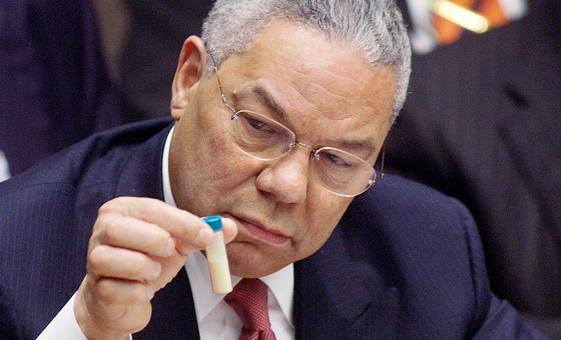This #ThrowbackThursday, we looked at his claim and what was in the vial.
On 5 February 2003, Mr. Powell addressed the Council, laying out the case for the US invasion of Iraq the following month.
“Every statement I make today is backed up by solid sources,” he said. “What we’re giving you are facts and conclusions. Clearly, Saddam Hussein and his regime will stop at nothing until something stops him.”
During the hour-long multimedia presentation, the Secretary of State narrated a detailed video and slideshow of satellite images, audio recordings of intercepted phone calls and illustrations showing, among other things, trucks and train cars allegedly serving as mobile production facilities for biological weapons in Iraq.
At the time, he told the crowded Council Chamber that Mr. Hussein was determined to keep his WMDs and to make more, including the biological agent anthrax.
“Less than a teaspoon of dry anthrax…about this amount,” Mr. Powell explained, raising a tiny vial containing a beige powder-like substance before him, “shut down the United States Senate in the fall of 2001.”
Continuing, he said Iraq had “declared 8,500 litres of anthrax”.
“Saddam Hussein has not verifiably accounted for even one teaspoonful of this deadly material,” he went on to say, still dangling the vial in his fingertips. “Iraqis have never accounted for all of the biological weapons they admitted they had. This is evidence, not conjecture.”
Mr. Powell later stated that he regretted these remarks, according to media interviews.

UN Meetings Coverage chief Mugeni Badjoko (far right centre table) was among a team of UN press officers covering US Secretary of State Colin Powell’s presentation to the Security Council in February 2003. (file)
But, in the Council Chamber that day in 2003, the mood was extremely tense, blended with “oppressive silence, combative energy and fear”, according to UN Meetings Coverage chief Mugeni Badjoko (see photo above), who at the time was a press officer sitting a few metres away from the Secretary of State.
“Covering a Security Council ministerial meeting was something I was used to, but having the head of the CIA right behind Colin Powell in a packed room was something else,” she told UN News.
Recalling the moment Mr. Powell dangled his vial, which she thought could have been “full of anthrax”, Ms. Badjoko said murmurs swept across the Chamber.
“At first, I couldn’t believe my eyes,” she said. “If you look at the picture, you can see I am literally on the edge of my seat.”
Read the full summary of the presentation along with the subsequent Council debate as well as Iraq’s statement at UN Meetings Coverage here.
Meanwhile, there was no UN Security Council resolution authorizing military action in Iraq. A little more than a month after that meeting, the US invaded the Middle Eastern country.
Two months later, the Security Council-mandated UN Monitoring, Verification and Inspection Commission (UNMOVIC) presented its own findings on Iraq in a report.
Watch UN Video’s episode here. Drawn from almost 50,000 hours of historical footage and audio preserved by the UN Audiovisual Library, the series highlights moments across the first century of UN operations.
Catch up on UN Video’s Stories from the UN Archive playlist here, read our accompanying #ThrowbackThursday series here and listen to our Podcast Classics series here. Stay tuned next week for another dive into the past.

